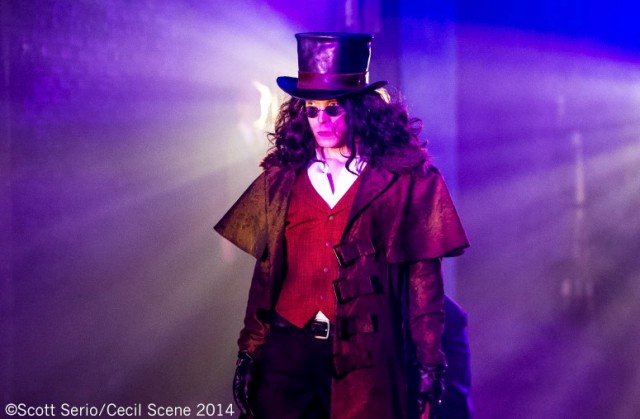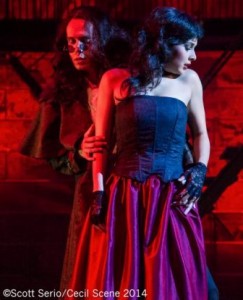Theatre is an all encompassing medium for expression of thought. The ideas that form the bases for theatrical works come from everywhere, e.g., fine art, poetry, news, current events, social problems and in the case of this review, literature. Milburn Stone Theatre (MST) has taken the musical, JEKYLL & HYDE, based upon a piece of classic literature and has brought a rousing production to their stage. Robert Louis Stevenson, the Scottish author who wrote the original novella titled, Strange Case of Dr. Jekyll and Mr. Hyde, had long been intrigued with how the human personality worked and how the various aspects of a personality formed the whole person seen by others. Having his novella in Victorian England added the strictures of that era. The dichotomy between the outward respectability and inward waywardness only sharpened the edges of the protagonist’s conflict.
Let’s state now that reading the novella published in 1886 is a far cry from what can be seen on stage as performed by the talented troupe assembled by director, S. Lee Lewis. Being a musical allows the novella themes of good and evil to be highlighted with mournful melodies, the poetry of lyrics of doom and lost love, and the pounding of an omnipresent beat (think heart). While there are differences in actions and people between the two pieces, there is unity in presenting the needs, the decisions and the consequences of the main characters. Lewis and his scenic/video/projection designer, Bob Denton, created a dark laboratory with corners and spaces from which evil things could appear. Using staircases gave the production levels and allowed action to flow without interruption. The use of videos showing both the oddities of natural science and the new “study in motion” camera technology of Edweard Muybridge brought the audience into a time where science was still viewed with skepticism and immorality was hidden in plain sight. The additional usage of ensemble to serve wine to those who paid to sit on the stage was intriguing, but somewhat off-putting since the ambience being created on the stage by the lighting, videos and appearance of Dr. Jekyll was disturbed by modern language and attitudes and “last call” announcements from center stage. As usual, MST used live music and it was grand to hear. For the first act, the usual sound blending problems seemed to have vanished, and each song was presented with passion and heard well. The microphone problems occurred in the second act, but it is nice to know that work is progressing in the area of sound. Kudos to Terry Edwards and Shane Jensen for the work they did in providing a meaningful sound and music backdrop to this dark tale.
Dr. Jekyll is described by Stevenson as a “large, well-made, smooth-faced man of fifty with something of a stylish cast”. Adam Wahlberg does not fit that physical description but did everything necessary to convince the audience of his personal anguish, scientific arrogance, and willingness to sacrifice whatever was necessary to accomplish what he saw as his “greater good”.
Wahlberg has a physical lankiness which worked both as scientific ascetic and as the leonine Mr. Hyde. His constrained demeanor with Emma (his fiancé) contrasted excellently with the animalistic appearances of Hyde. During the first change, Wahlberg picked up items of clothing from others in the street and “created” the physical persona of Hyde. However this decision was made, it was very theatrical and effective in defining the predatory nature of Hyde. This is a physically and psychically demanding role which must exhaust Wahlberg every night. Never did he falter, however, and that is the sign of a actor truly committed to his role.
Speaking of commitment, the role of Emma Carew was played with vulnerability and passion by Erika Bankerd. The chemistry between Wahlberg and Bankerd was palpable and added much to the songs and scenes they had together. Less effective was Shereen Ahmed as Lucy Harris. Whereas Emma is a woman in love with one man; Lucy is a woman of many men. She is not delicate nor is she genteel. Her relationship with Jekyll is drawn from the fact that she WANTS to be something else and she realizes that only Jekyll can give her that. She is a Victorian whore and as such her demeanor, language and physicality all need to tell us of her struggle to be someone she is not. Ahmed is a capable actress and has done well with other roles at MST, but Lucy is a complex person from a bygone age and it seemed slightly beyond Ahmed’s reach. There is always hope that as the play continues, Ahmed will find her “Lucy” and share her with future audiences.
Effective use of the ensemble of supporting players is something that Lewis also excels at and he has done so again. The early scene with the Hospital Board denying Jekyll his request to do human testing is staged so that each Board member is presented above and looking down on Jekyll. The song, “Board of Governors”, is enthralling and is a potent introduction to each of these Victorian characters. The actors portraying the Board give masterful renditions of their stuffy, self-important, superior selves and are so successful that it is a little difficult to feel empathy at their vicious demises.
As usual with most MST productions there is an actor who is deserving of special credit. In the case of JEKYLL & HYDE, it is Lance Bankerd as Simon Stride. A more hateful person on stage it is hard to recall, and Bankerd’s interpretation brings the audience face-to-face with a true Victorian villain.
MST has succeeded with another musical. The reasons to see this production are myriad but include: beautiful singing backed by quality music, superior performances by both new and resident MST players, and a sense of timelessness in this presentation of what life can become if we forget that we all are created with BOTH evil and good. The state of the current world seems to indicate that evil is winning … maybe by using JEKYLL & HYDE as a guide, the world can see that we need to turn away from the evil of Mr. Hyde and move toward the light of accomplishment and peace sought by the good Dr. Jekyll.
JEKYLL & HYDE
Book and Lyrics by Leslie Bricusse
Music by Frank Wildhorn
Conceived for the stage by Steve Cuden and Frank Wildhorn
Directed by S. Lee Lewis
June 20 – 29, 2014
Milburn Stone Theatre
Cecil College
One Seahawk Drive
Northeast, MD 21901
Box Office: 410-287-1037
www.milburnstone.com



